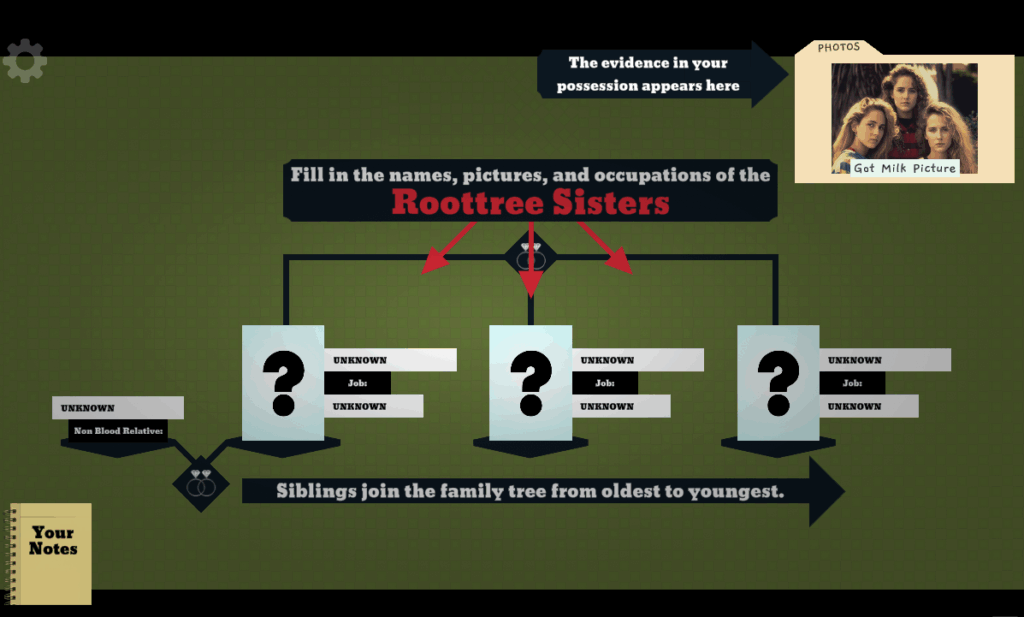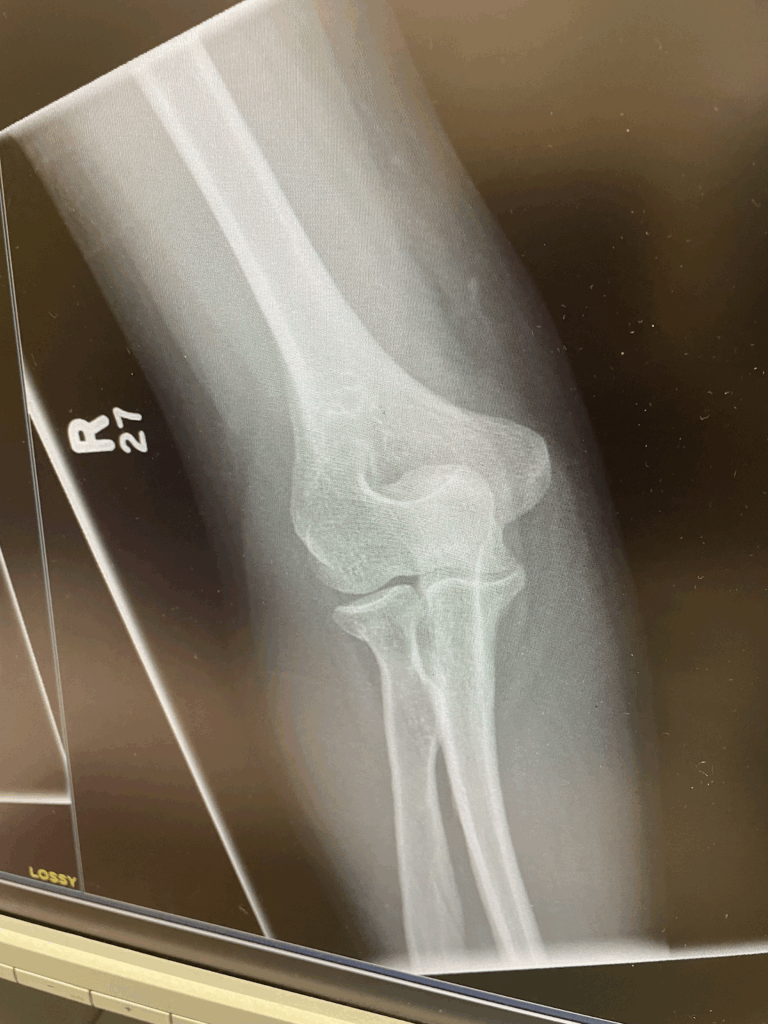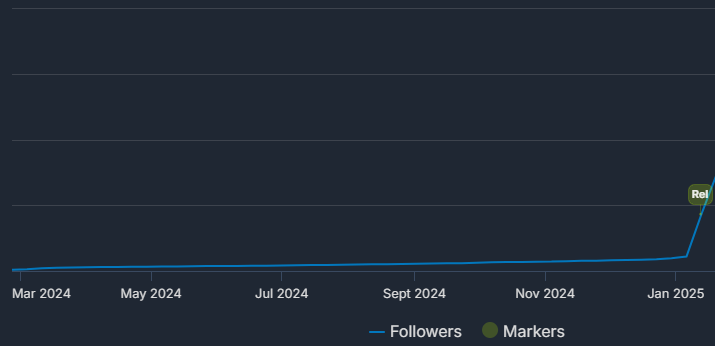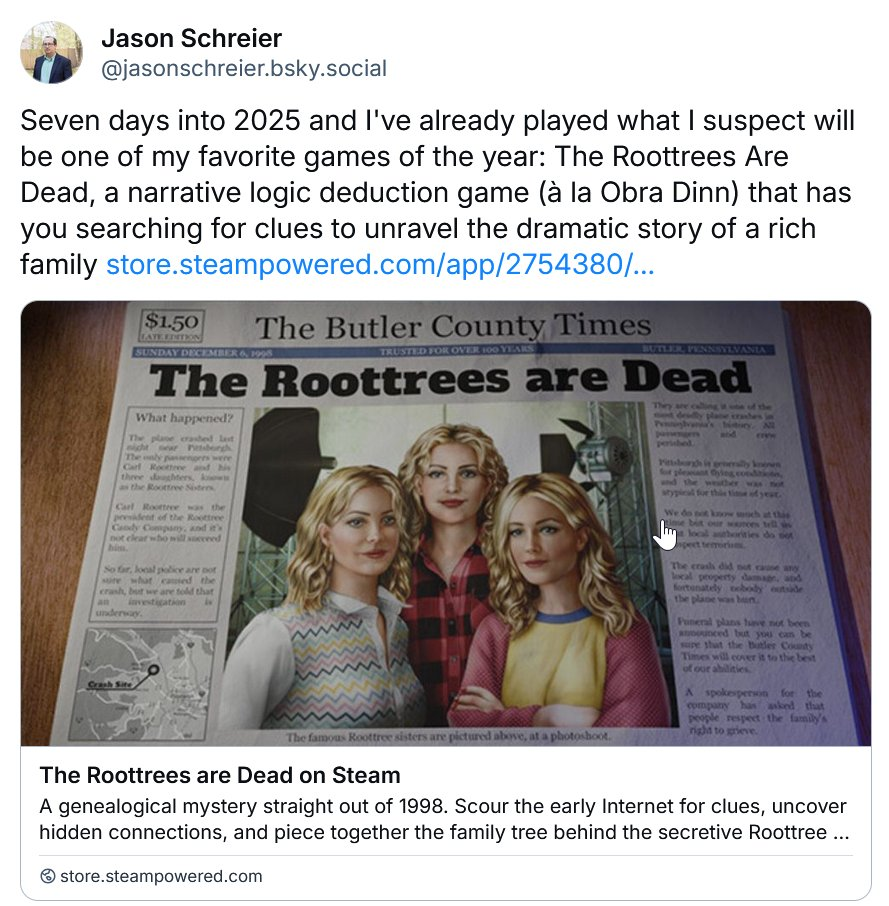
The Roottrees are Dead is an amazing case study of how a narrative puzzle game emerged from a polished game jam game that was published to itch.io for free, then found some early interest by fans, then over the course of a year remade as a $19.99 Steam game and went on to earn over a million dollars.
The hardest and riskiest part about making games is that they take a long time and require an immense amount of resources. It is a huge upfront cost and you won’t know if that investment will pay off until launch many months later (more likely years.) It’s also really hard to predict success. Fans are fickle. Raw wishlist count isn’t a guarantee of success and even a well-developed, good-looking, game can fail to take off with the public if they don’t find it “interesting” or it is a genre that players are bored of.
There is the constant nagging feeling of “should I continue investing more time and money into this game? I am not even sure this will earn a profit.”
This is why this story is so interesting: A developer spent 11 months polishing a game jam game part time and with basically no expenses outside of his own time. Even with that short of a development time the game showed enough externally validated promise that it warranted working with a partner and hiring an artist to work another year to make a Steam version that became a huge hit.
Part 1: The game jam
Jeremy Johnson is a game designer who came up with the original idea and first prototype of the game. In full disclosure I have known the guy for over 10 years as he is a regular in the Phoenix, Arizona game dev scene. He was also a designer at Rainbow Studio and worked as a level designer on games Like Monster Jam Steel Titans 2.
2023 January: Global Gamejam
Every year Jeremy participates in the Global Game Jam. He works alone but goes to the in-person Phoenix Game Jam site. The theme for the 2023 edition was “Roots.” Jeremy took the theme to mean “tree roots” and expanded that to mean “family tree.” He was inspired by Return of the Obra Dinn and Her Story and detective games.
But 2023 was also the time Midjourney was really taking off and he was inspired by its ability to generate faces. Jeremy wondered what kind of games could emerge if you could generate infinite faces.
So he got to work. At the end of the 48 hour game jam he had a the core of The Roottrees are Dead. It was a family tree mechanic and a bit of a narrative. It was playable and the reception from the other local game jam participants was good. But Jeremy had many more ideas that were in his brainstorming miro board but he didn’t have time to implement.
Itch.io version of the core experience: the family tree:

2023 February
For the last four or five years, Jeremy has taken an extra month to polish his game jam games to fill in any more ideas he didn’t have time to implement. Then he uploads it to itch.io. When he first started game jamming he would leave them on the archived global game jam site here: https://v3.globalgamejam.org/users/jjohnstongames).
More recently, to make sure people could play them he’s exported them in WebGL and put them on his itchio page: https://jjohnstongames.itch.io/)
But in 2023 Jeremy was feeling good about this particular project. He noted in a dev log “I knew my ambitions were beyond the scope of the jam so I got a prototype working with the basic features during the weekend, and decided that I would finish the rest of game in the next few months.”
Jeremy continues development. To meet other game developers Jeremy regularly offers feedback to people asking for playtesters over in r/gamedev. This time Jeremy was the one asking for feedback. He posted to the Obra Dinn subreddit and in various puzzle game discord. Here is an example post of him asking for playtesters.
His playtesters LOVED it and told him he really had something. He used this to keep pushing development deeper. He also took their feedback seriously. He watched their recordings and made improvements based on how they tried to solve the puzzles.
2023 March
Gaming personality and PC Gaming show host Sean “Day[9]” Plott hosted an online 30-day challenge in his forum so developers would have accountability partners to get their projects done.
Jeremy used this challenge to keep himself accountable and push to finish the expanded Roottrees are Dead prototype. You can read Jeremy’s dev log on Day9’s site here.
One night Day9 played the 30-day challenge games and was completely blown away by the Roottrees are Dead prototype. Seriously, if you want to get inspired, watch Day9 play his game. I have timestamped the exact start:
After 3-months of development, Day9’s reaction was one of the strongest signs that The Roottrees are Dead had *THE MAGIC*
2023 November
After months and months of constant playtests and iteration on the game’s story, puzzles, and overarching structure, Jeremy finally uploads The Roottrees are Dead for free on itch.io.
You can still play it for free.
Although under the hood The code is completely gamejam spaghetti code, from the outside it is not some slapped together game jam game. It is a complete narrative game that takes about 8 hours to complete. The core game requires you to identify 50 people within the Roottree family tree. Read his launch update.
This itch.io version of The Roottrees are Dead still uses AI-Generated art so Jeremy decided to make the game free. Jeremy does set up a tip jar for the game.
Amazingly, the tip jar earns him $3,000 in the first month.
At this point, the game grows completely from word of mouth. Here is his itch.io traffic during that launch period. There are a couple youtubes made but none of them getting more than 6,000 views
- https://youtu.be/w-ZwMnfXquo
- https://www.youtube.com/watch?v=kWY23Ziw5ws
- https://youtu.be/IuGQDxh26K0
Here is the complete stat history for the itch.io version of the game:

For a free game on itch.io with only word-of-mouth marketing, this is HUGE. This is what THE MAGIC looks like on itch.io
Part 2: Robin Takes Over
2023 December
Robin Ward is a software developer who found his way creating the company that made the Discourse forums and then sold his share of the company. Like many software developers he was working on a game.
In November 2023 Robin walked his dog, tripped, broke his arm and was out of commission for several months. Here is a picture of it.

While he was recuperating he looked for slow-paced games that wouldn’t aggravate his broken arm. That’s when he discovered The Roottrees are Dead. He was smitten.
I don’t know how to explain it better than thinking ‘this game should be much more popular than it is.’ I realized it was probably due to AI art, which Jeremy confirmed
I thought about how long and how much it would cost to remake, and also that whenever I look at forums for thinky games like Case of the Golden Idol there’s always tons of people asking for more games like it
Robin Ward
So Robin abandoned his in-progress game and gave Jeremy a pitch: let him completely re-code the game, fully pay for an artist to redraw every bit of AI Generated Art, and then publish it on Steam for him in exchange for a revenue share. Jeremy wouldn’t have to lift a finger, wouldn’t have to pay for anything out of pocket.
Jeremy is interested and did some background his research on this Robin guy. To show he is serious, Robin recreates the core detective room within days. It was good! It won Jeremy over and they partnered up.

Meanwhile, word of mouth continues to grow for the free itch.io version of the game and the AV Club writes a glowing review of it. They later consider one of the Top games of 2023
Robin takes over the Steam version of the game. But before he go 100% on it, he and Jeremy have to figure out what to do with the free itch.io version of the game. Jeremy knows he can’t work on the game with Robin due to having full time obligations, so the two of them spend a handoff period answering as many questions as they can on paper.
There are two main problems:
1) How do you make a paid game successful if the free version exists on itch.io (which Robin is adamant they do)?
2) If all of the AI art has to be replaced, and the style of it is a huge part of the game’s identity, how do you go about replacing it?
They decide that the Steam version will be a *nearly* 100% recreation of the original game with 50 people in the tree. BUT the paid Steam version will have even more content. There will be a whole second chapter with 30 additional people to identify.
While Robin starts the Roottrees are Dead recreation, Jeremy uses the remainder of the handoff period to do two main things:
First, to pass off the game’s content to Robin for use in the new godot version.
Second, to provide articles and lore that make up the game’s expansion, Roottreemania.
Robin completely rewrites the game from scratch in Godot. The itch.io version of the game was a pile of game jam code and Jeremy admits that he “codes like a designer.”
Because the Godot version of the game was barely started, Jeremy writes this expanded lore in google spreadsheets, on a miro board, and by prototyping that new content in a branched itchio version of the game.
They also have to decide what the new non-AI art style is. They consider hiring models and using actual photos as the art style. But, because the game takes place over 100 years they would have to create hundreds of costumes which would be financially impossible. So they go for an illustrated look. They search for several artists but realize the best person to draw portraits for a game about finding clues is someone who has experience creating portraits for the actual board game Clue: Henning Ludvigsen
Here are Henning’s illustrations for Clue the Illusionist’s Club

I highly recommend you read Robin’s blog post on how he rebuilt The Roottrees are Dead.
2024 February – January 2025
In February I gave a game marketing talk to the Phoenix game dev community about how Steam works and begged everyone in the audience to get their Steam pages up as soon as possible (follow this guide to see how soon is soon enough.) Jeremy and Robin listen and actually do it! That nugget of advice was enough work for me to get a place in the credits.

At this point Jeremy stops work on the Roottrees are Dead due to prior obligations. Robin takes over and works full time on getting the game finished and released on Steam.
Screenshot of Robin’s updated version of the game with a professional artist at the helm:

Wishlists grow slowly but steadily which is typical of a word-of-mouth game. Here is their follower count.

Robin does not create a demo, does not contact streamers, or enter festivals. Not even Steam Next Fest.
“I was the only programmer on the project and I was stretched thin. I didn’t want to split my focus on making a demo”
Robin
For nearly 10 months Robin let the game slowly collect wishlists and it got up to 8,000 wishlists before launch.
Two weeks before launch Robin and a fellow investor begin reaching out to the press and anyone who said anything good about the game.
One week before launch, Jason Schrier (journalist and industry muckraker (see Play Nice)) posts the following message on Blue Sky.

Jason Schrier confirmed with me that their customized email pitch subject line did the trick:
Robin reached out to me a few weeks ahead of the Roottrees launch with the email subject: “I know you loved Golden Idol – I think you’d like my game!” That was all he needed to say to get my attention. A broader email like “The Roottrees Are Dead is out now” might have just gotten buried.
Jason Schrier
This coverage coincides with a huge influx of wishlists from Popular Upcoming and the game launches with over 13,000 wishlists.
January 15, 2025 LAUNCH
The game launches and has instant takeoff. The press loves to cover this type game (who would have thought a game about reading and investigating would be popular with journalists?) It gets an 87 metacritic score.
AV Club re-reviews Robin’s updated version of the game.
The game is a hit. It reaches over 1000 reviews in 3 weeks.
Spring 2025
Jeremy rejoins Robin’s team full time after the game proves its ongoing success.
Since launch, the game has earned over $1 million dollars.
Three weeks ago, Day9 started streaming the Steam version of the Roottrees are Dead and offered a really heartwarming look back at the impact he had on the game in its inception. Again, if you want a dose of inspiration, watch Day9 introduce this game to his co-hosts and the journey he went on with it.
A feeder platform
The Steam playerbase is demanding. They want high quality assets, super deep gameplay, no bugs, no jank. Also, you only get one shot at many of the visibility tools: New & Trending Free, Popular Upcoming, New and Trending.
It is expensive and risky to publish a game on Steam. But your game also must have an intangible “magic” or fun that must survive through all of the polish and iteration. Too many games on Steam are polished, and look good, but at their core aren’t fun.
I think too many developers spend years polishing a game that was never that fun to begin with.
So how do you get a lot of feedback and find out if your game has *the magic* before you spend years polishing and adding extra content? We need a feeder platform that can incubate games before tens and hundreds of thousands of dollars are spent polishing them.
I think more devs should look at secondary feeder platforms that are more open to games built quickly and are more “sketched-together” games that might not be polished (and maybe a bit janky), but are at their core fun.
Back in the day flash sites like Kongregate were this.
I suspect Roblox is an option (but don’t have any case studies yet).
Mods to existing games can do this.
The Roottrees are Dead prove that Itch.io has the most promise to be this secondary feeder platform to test game ideas.
Summary
So what are the lessons?
Here are some
- If a game has the *magic* you can tell very fast: even if it is free, it contains AI art, and is a pile of gamejam spaghetti code. If the concept is there and shows early signs that fans love it (or day9), it is worth diving deeper.
- Itch.io is an amazing community. You won’t make much money there, in fact, they are often hostile to even asking for money. But as an incubator, it has great promise. The fan base is ok with jank and can put up with in-progress work. This is where you should do limited playtests, put your game out there, like Jeremy did with Day9, and if there is interest, expand scope.
- The itch.io version of Roottrees are Dead is playable in browser. Jeremy said this was critical in getting playtesters to try it and the press to cover it. There was 0 barrier of entry and no sketchy .exe to install.
- Organic visibility from itch.io is hit or miss. It seems like you do need to do some promotion to both the itch.io managers and to content creators. (I need to do more research on this, see survey link below).
- If there is interest from itch.io it could be a sign that you can go on to sell the game on Steam.
- The Steam audience and the itch.io are distinct. I find itch.io is for players who are promiscuous with their genres, want to play the avant garde, and are willing to give you their feedback. Steam is for hard core players who have high expectations and are dedicated to their preferred genres.
- Even though the Steam version of The Roottrees are Dead didn’t have a demo, the free itch.io served a very similar function. People don’t understand if they like a game until they play it.
- Free versions of games don’t necessarily cannibalize sales. Basically early adopters and early players become ambassadors. If a game has *the magic*, there is an infinite number of available players out there who have never heard of the game. Hell, I have known Jeremy for 10 years, and he sent me some early concepts of the itch version of the game, but I completely forgot about it until I saw The Roottrees in my Q1 2025 roundup. The limiting factor is not visibility, it is *magic*. YOU CAN NEVER OVER-EXPOSE YOUR GAME if it has *the magic*
- Detective narrative puzzler games are hot. If you search Reddit for “roottrees” you will see tons of posts that are asking “Are there any more games like Obra Dinn?”
and then someone comments “The Roottrees are Dead” like this one for example. - Your early champions and feedback will come from fellow developers. I love how Jeremy found them. He just started playtesting other developers’ games and gave them feedback and they became game dev friends.
- If you want to pull a Robin Ward and want to turn a promising, but funky, itch.io out of obscurity and publish it on Steam, show the original developer you are serious by building an example of what you can do.
SURVEY: Does your itch.io game have the magic?
After reading this, you might be tempted to go back to your itch.io account and review the stats of your games to see if you have any future Roottree hiding in projects.
Here are some signs Jeremy was onto something:
- His itch.io tip jar earned him $3000 in the first month
- Itch.io saw such great numbers on the backend of the game, they decided to upload the trailer to their official youtube channel. YOUTUBE LINK (jeremy said “They didnt tell me they were going to do it. They just chose it because our game was doing well I believe”)
- Day9 went bananas for the game live on stream.
- The AV Club listed it as one of their “Games of the Year”
Here is The Roottree’s lifetime itchi.io stats. Do you have anything similar?

I have written about how hit Steam game Peglin started as an itch.io game jam game. After the itch.io release, fans were begging the developer to add more levels and power ups.
So many people ask me if they can test if their game idea has *the magic* by throwing together a quick Steam page and watching to see if it will go viral. I don’t advise that because Valve rarely pulls Steam pages so it will live on forever. Also Valve starts to look down on you if you have dozens of abandoned projects.
Itch.io is a great way to test quick prototypes.
However, I don’t have any data on what a “magic game” looks like on itch. I don’t have any benchmark data to reference.
There is also a danger that developers over-interpret the data of their own itch.io game convincing themselves that it has the magic. Many times developers tell me “My friends love our game jam game! When I ask them if they would buy it on Steam, 100% of them said yes!”
That is just your friends being nice. That is not data.
Or they say “Everyone at our local game jam had fun playing our local multiplayer game!” Maybe they did, but remember this isn’t a neutral audience: everyone is delirious after a weekend of coding, and there is a bit of a foxhole friendship that formed that could trick you into thinking the reception is better than it is.
We need more standardized data that you can compare against to determine if your game actually has *the magic* on itch.io.
So, can you please help me and other developers by sharing your experiences with itch. Please complete the following survey sharing your data.
If you have an itch.io game (even if it didn’t do well, please complete the survey).
If you have multiple games, fill it out multiple times: